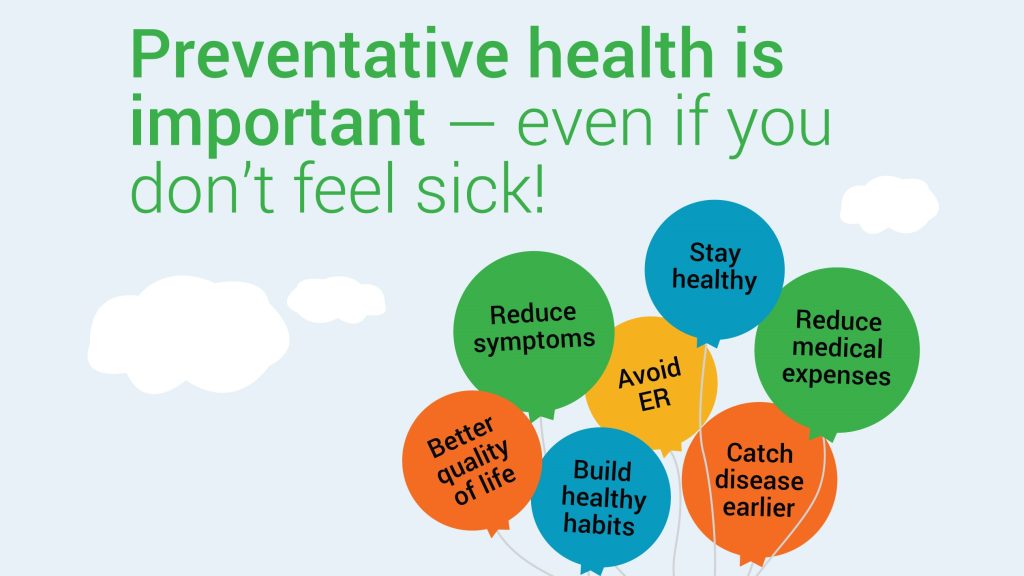The Importance of Preventative Healthcare: Regular Check-ups and Screenings

Preventative healthcare is a dynamic approach to preserve health and avert disease before it becomes a serious issue. Regular check-ups and screenings are vital sections of this approach, offering numerous benefits that can lead to better health outcomes. This article will dive into the significance of preventative healthcare, the types of regular check-ups and screenings everyone should consider, and the long-term benefits of staying proactive about your health.
What is Preventative Healthcare?

Preventative healthcare focuses on preventing diseases and exposing or catching health issues at an early stage when they are more manageable and treatable. It borders a range of services including screenings, check-ups, counseling, and immunizations, all aimed at maintaining and improving overall health.
Preventative healthcare is not only about averting illness but also about fostering a healthy lifestyle that includes balanced nutrition, regular physical activity, and mental well-being. By taking a proactive approach, individuals can significantly reduce the risk of chronic diseases such as diabetes, heart disease, and cancer, which are often preventable with early intervention.
Benefits of Regular Check-ups
Regular check-ups with a healthcare provider are essential for monitoring and maintaining health. Here are some key benefits of routine medical visits:
- Early Detection of Health Issues: Regular check-ups can help uncover health problems early, before they become severe. Early detection often means more effective treatment and a better diagnosis.
- Monitoring Existing Conditions: For those with chronic conditions like hypertension or diabetes, regular check-ups are important for managing the disease and preventing complications. Regular monitoring can help adjust treatment plans as needed.
- Preventive Screenings: During check-ups, healthcare providers can recommend and conduct preventive screenings that are applicable for the patient’s age, sex, and health history. These screenings can identify risk factors and early signs of diseases such as cancer, heart disease, and osteoporosis.
- Vaccinations and Immunizations: Routine visits are an opportunity to stay up-to-date with vaccinations, which are important for preventing infectious diseases.
- Health Education and Counseling: Healthcare providers can offer valuable advice on healthy lifestyle choices, including diet, exercise, stress management, and smoking cessation. This suggestions can empower patients to make informed decisions about their health.
- Building a Relationship with Your Healthcare Provider: Regular paying visits help build a trusting relationship with your healthcare provider, making it easier to discuss concerns and seek advice when needed.
Essential Preventive Screenings
Preventive screenings are tests or exams used to detect potential health issues before symptoms appear. Here are some essential screenings that should be part of a regular health maintenance plan:
- Blood Pressure Screening: High blood pressure is a major risk factor for heart disease and stroke. Regular screening can help detect hypertension early, allowing for timely intervention.
- Cholesterol Screening: High cholesterol levels can lead to cardiovascular disease. Screening involves a simple blood test to measure levels of LDL (bad cholesterol), HDL (good cholesterol), and triglycerides.
- Blood Glucose Screening: This test measures blood sugar levels and can help identify prediabetes or diabetes, allowing for early management and prevention of complications.
- Cancer Screenings:
- Mammograms: For women, mammograms are critical for the early detection of breast cancer. Guidelines generally recommend starting annual or biennial screenings at age 40 or earlier for those at higher risk.
- Pap Smears and HPV Testing: These tests are essential for detecting cervical cancer and human papillomavirus (HPV) infections.
- Colonoscopy: Recommended for adults over 50, this test screens for colorectal cancer and allows for the removal of precancerous polyps.
- Prostate-Specific Antigen (PSA) Test: For men, especially those over 50, this test helps detect prostate cancer.
- Bone Density Test: Especially for postmenopausal women and older adults, this test measures bone strength and can help diagnose osteoporosis, preventing fractures.
- Eye and Ear Examinations: Regular eye exams can detect vision problems, glaucoma, and macular degeneration, while hearing tests can identify hearing loss, especially in older adults.
- Skin Cancer Screening: Regular dermatological exams can help detect skin cancers like melanoma at an early, treatable stage.
- Immunizations: Staying current with vaccinations, including flu shots, tetanus boosters, and pneumococcal vaccines, is crucial for preventing infectious diseases.
Age-Specific Preventive Screenings
Preventive healthcare is tailored to the needs of individuals at different stages of life. Here are some age-specific recommendations:
- Children and Adolescents:
- Regular well-child visits to monitor growth and development.
- Immunizations according to the recommended schedule.
- Vision and hearing screenings.
- Counseling on nutrition, physical activity, and mental health.
- Adults (20s to 40s):
- Blood pressure, cholesterol, and glucose screenings.
- Pap smears and HPV testing for women.
- Testicular exams for men.
- Skin cancer checks.
- Counseling on lifestyle choices and mental health.
- Middle-Aged Adults (40s to 60s):
- Continuation of screenings from earlier decades.
- Mammograms and colonoscopies.
- Prostate cancer screening for men.
- Bone density tests for women post-menopause.
- Eye exams for vision problems and glaucoma.
- Older Adults (60s and beyond):
- More frequent monitoring of chronic conditions.
- Regular screenings for cancer, osteoporosis, and cardiovascular diseases.
- Vaccinations for flu, shingles, and pneumonia.
- Counseling on fall prevention and cognitive health.
The Role of Lifestyle in Preventive Healthcare
While regular check-ups and screenings are vital, a healthy lifestyle is equally important in preventive healthcare. Here are some lifestyle practices that can significantly reduce the risk of chronic diseases:
- Balanced Diet: Consuming a diet rich in fruits, vegetables, whole grains, lean proteins, and healthy fats supports overall health and helps prevent obesity, diabetes, and heart disease.
- Regular Physical Activity: Engaging in at least 150 minutes of moderate aerobic activity or 75 minutes of vigorous activity per week can improve cardiovascular health, strengthen muscles and bones, and enhance mental well-being.
- Adequate Sleep: Quality sleep is essential for physical and mental health. Aim for 7-9 hours of sleep per night to support immune function, mood regulation, and cognitive performance.
- Stress Management: Chronic stress can contribute to various health issues, including hypertension and mental health disorders. Techniques such as mindfulness, meditation, yoga, and deep breathing exercises can help manage stress effectively.
- Avoiding Tobacco and Limiting Alcohol: Smoking cessation and limiting alcohol intake can significantly reduce the risk of cancer, liver disease, and cardiovascular problems.
- Hydration: Drinking enough water is crucial for bodily functions, including digestion, temperature regulation, and toxin elimination.
- Mental Health Care: Taking care of mental health through regular check-ins with a mental health professional, engaging in hobbies, and maintaining social connections is important for overall well-being.
Overcoming Barriers to Preventive Healthcare
Despite the clear benefits of preventive healthcare, many people face barriers that prevent them from seeking regular check-ups and screenings. Here are some common barriers and ways to overcome them:
- Lack of Awareness: Educating the public about the importance of preventive healthcare through community programs, media campaigns, and healthcare provider outreach can increase awareness.
- Financial Constraints: High healthcare costs can be a barrier. Exploring insurance options, government programs, and community health services that offer free or low-cost screenings can help.
- Accessibility Issues: Geographic barriers and lack of transportation can prevent access to healthcare services. Mobile clinics, telemedicine, and community health centers can provide more accessible options.
- Cultural and Language Barriers: Providing culturally sensitive care and offering services in multiple languages can help bridge the gap for diverse populations.
- Fear and Anxiety: Fear of diagnosis or medical procedures can deter individuals from seeking care. Creating a supportive and non-judgmental healthcare environment can encourage more people to attend regular check-ups.
Preventive healthcare, through regular check-ups and screenings, is a foundation of a healthy life. By identifying health issues early and promoting healthy lifestyle choices, individuals can significantly reduce the risk of chronic diseases and improve their overall quality of life. Overcoming barriers to preventive care and increasing public awareness are essential steps in ensuring that everyone can benefit from the advantages of proactive health management. Taking charge of your health today can lead to a healthier and more fulfilling tomorrow. See how…
